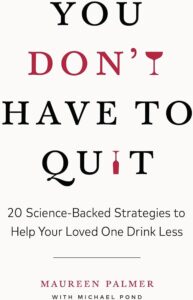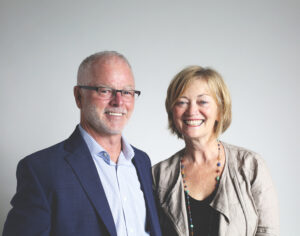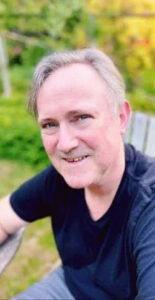An alternative to “rock bottom”
You Don’t Have to Quit: 20 Science-Backed Strategies to Help Your Loved One Drink Less
by Maureen Palmer (with Michael Pond)
Vancouver: Page Two, 2024
$21.95 / 9781774584668
Reviewed by Daniel Gawthrop
*

As far as alcohol use disorder (AUD) is concerned, Maureen Palmer and Michael Pond are something of a power couple in the BC recovery movement. Through their own example as life partners—Palmer has publicly supported Pond through his challenging struggle with alcohol addiction—they have exposed the limits of abstinence as a punitive treatment model while demonstrating that every addict’s relationship to alcohol is different and should be treated accordingly.
You Don’t Have to Quit is a follow-up to Wasted: An Alcoholic Therapist’s Fight for Recovery in a Flawed Treatment System (2016), a companion to the critically acclaimed CBC documentary featured on The Nature of Things. The story of Pond’s struggle with addiction, Wasted explored how its subject went from being a successful therapist and family man in Penticton, a bon vivant who enjoyed life in BC’s wine country, to a shattered and spiralling alcoholic who lost everything—family, home, business—and ended up on Vancouver’s Downtown Eastside, and then a hospital emergency ward, before his lengthy climb back to healthy living.

Palmer, a long-time CBC producer for both radio and television, and co-founder of the documentary company Bountiful Films, met Pond after his recovery. Despite his warning her of the risk for potential setbacks, the two became romantically involved and Palmer was inspired to produce a documentary about Pond’s struggle. The pair were well into the filming for Wasted when Pond fell off the wagon, lending the project new urgency. Suddenly, the personal shame of being a therapist guiding clients through their own addictions before succumbing to his own resurfaced with the sense that he was letting down Palmer. Both had to reset the boundaries of their relationship while confronting their preconceptions about recovery.
* * *
You Don’t Have to Quit begins with a look at current drinking rates, mostly with US statistics. Palmer reports that one third of all American adults are at risk of alcohol dependence—the point at which one’s drinking is no longer a matter of will power to control. (As of 2021, the most recent Statistics Canada figures, it’s closer to one fifth in this country.) Having read all the “quit lit” on alcohol addiction, Palmer realized that abstinence—which recovery organizations like Alcoholics Anonymous (AA) advocate—is not the only solution. On the contrary, it can be the wrong solution for many. Instead, she argues, harm reduction principles should be applied to AUD just as they are to opiates or other addictive substances.
Citing her interviews with some of the world’s foremost experts on addiction, from behavioural scientists to neuroscientists, Palmer concludes that “connection, empathy and compassion are essential to reducing alcohol dependency” and that guilt-tripping blame and aggressive confrontation serve no purpose but to increase it.
A more compassionate approach requires language that empowers the sufferer. So instead of “substance abuse” it’s AUD, instead of “relapse” it’s “setback,” and instead of “co-dependent” or “enabling,” it’s “allyship.” But being an ally does not mean being a doormat for your chemically-dependent partner. The twenty strategies presented here require mutual honesty and accountability to work most effectively, and—surprise, surprise—are best applied before the drinker’s behaviour progresses to the AUD stage.

Palmer and Pond reject the all-or-nothing approach of AA, which calls for abstinence and often requires the drinker to reach “rock bottom” before healing is possible. One key strategy for early intervention with problem drinkers is to watch for signs of developing dependence: drinking more than they intend to, relying on alcohol to deal with emotions, losing control of how much they drink, and neglecting things they care about, for example. You know things are going off the rails when they’re struggling to keep it together at home, work, or school because of booze.
Understanding the addicted brain is key to creating empathy, says Palmer. For the drinker, it means checking your behaviour. How many empties are in your recycling bin? Can you keep alcohol in the home without drinking it—that is, can an excellent bottle of wine remain in the fridge without your needing to “pair” it? For the ally, it might mean not tempting your partner with such “alcohol cues.” (Palmer, perhaps unfairly, blames herself for leaving a bottle in the fridge that Pond consumed while she was out of town and he was struggling to keep bedside vigil for his dying mother, with whom he had a complicated relationship.) Much of the advice is practical common sense: if it’s true that stress causes a craving for rewards in the AUD sufferer, then suggest going outside for a hike, an activity where the endorphin rush is its own reward.
The real enemy is the booze industry itself. Palmer shares some of “the dark underpinnings of Big Alcohol” that make recovery even more challenging: the targeting of women and girls through Hollywood and advertising, the “pinkwashing” of wineries and breast cancer agencies partnering up (“This is fundraising for breast cancer,” she writes, “with the very stuff that will give you breast cancer. Yikes.”), and Big Alcohol’s “drink responsibly” campaigns, which weed out the AA lost causes to keep everyone else partying.
Of the twenty strategies, one of the most important is finding the courage to be vulnerable. Could there be any better example of courageous vulnerability than exposing your relationship to the rest of the world? Palmer recalls an incident when she returned from a four-day shoot to find their home a complete mess with Pond in the middle of a three-day bender. He’s about to open another bottle of vodka and is prepared for a big argument. At first she hands him a glass of water and asks him to give her the bottle. But then she relents, telling him he can have the bottle and start sobering up in the morning. He thinks about it and changes his mind, giving her the bottle. “By leaving myself vulnerable and respecting Mike’s innate wisdom about his own disorder,” she concludes, “I gave him something powerful that had been missing in his past search for recovery: his own agency.”
This is a great outcome, of course, but not all that surprising coming from a highly functioning, well-educated professional who’s literate about his own addiction issues. Not every problem drinker has Pond’s degree of insight about their own condition, informed by decades of knowledge in the field, and might find such vulnerability more difficult to achieve.
As in Wasted, Pond wonders why he had to suffer unnecessarily for so long when a drug like vivitrol could have set him on the road to recovery much sooner. For this reader, it is shocking that, in 2024, the idea of doctors accepting harm reduction as a viable treatment option for AUD instead of abstinence is regarded as a “game changer.” This revelation seems at least three decades late, which is no doubt why Palmer calls for healthcare reform: some hospitals still kick out patients with AUD, citing a need to prioritize beds for “real sick people.”
You Don’t Have to Quit comes with some handy references for AUD resources and is helpfully presented with crisp, brief sections—an approach Palmer credits to a much different book, Timothy Snyder’s On Tyranny: Twenty Lessons from the Twentieth Century.

*

Daniel Gawthrop is the author of the novel Double Karma (Cormorant) and five non-fiction titles, including The Rice Queen Diaries (Arsenal Pulp Press). Visit his Substack here and website here. [Editor’s note: Daniel Gawthrop has recently reviewed Brian Antonson, Harman Burns, Ed Willes, Billy-Ray Belcourt, Yeji Y. Ham, Chad Soon and George Chiang, Hirsch and Cheryl A. MacDonald and Jonathon R.J. Edwards for BCR.]
*
The British Columbia Review
Interim Editors, 2023-25: Trevor Marc Hughes (non-fiction), Brett Josef Grubisic (fiction and poetry)
Publisher: Richard Mackie
Formerly The Ormsby Review, The British Columbia Review is an on-line book review and journal service for BC writers and readers. The Advisory Board now consists of Jean Barman, Wade Davis, Robin Fisher, Barry Gough, Hugh Johnston, Kathy Mezei, Patricia Roy, and Graeme Wynn. Provincial Government Patron (since September 2018): Creative BC. Honorary Patron: Yosef Wosk. Scholarly Patron: SFU Graduate Liberal Studies. The British Columbia Review was founded in 2016 by Richard Mackie and Alan Twigg.
“Only connect.” – E.M. Forster
2 comments on “An alternative to “rock bottom””